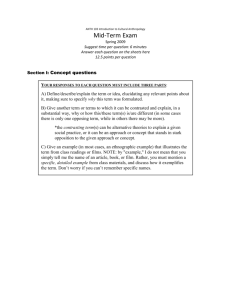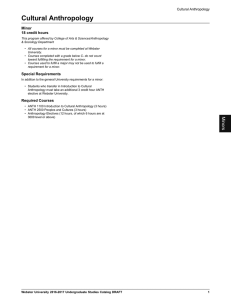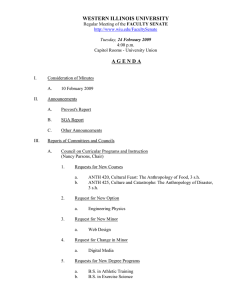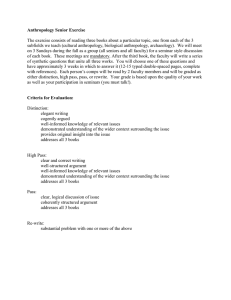Anthropology, Sociology, and Social Work Curriculum Change Attachment 3
advertisement
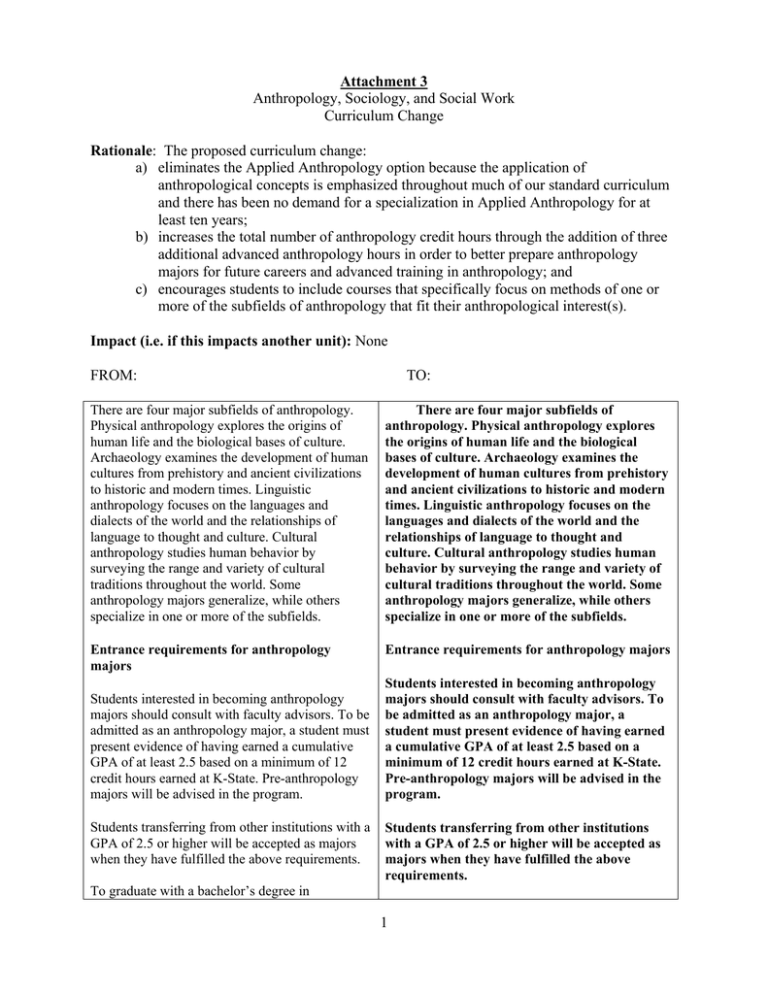
Attachment 3 Anthropology, Sociology, and Social Work Curriculum Change Rationale: The proposed curriculum change: a) eliminates the Applied Anthropology option because the application of anthropological concepts is emphasized throughout much of our standard curriculum and there has been no demand for a specialization in Applied Anthropology for at least ten years; b) increases the total number of anthropology credit hours through the addition of three additional advanced anthropology hours in order to better prepare anthropology majors for future careers and advanced training in anthropology; and c) encourages students to include courses that specifically focus on methods of one or more of the subfields of anthropology that fit their anthropological interest(s). Impact (i.e. if this impacts another unit): None FROM: TO: There are four major subfields of anthropology. Physical anthropology explores the origins of human life and the biological bases of culture. Archaeology examines the development of human cultures from prehistory and ancient civilizations to historic and modern times. Linguistic anthropology focuses on the languages and dialects of the world and the relationships of language to thought and culture. Cultural anthropology studies human behavior by surveying the range and variety of cultural traditions throughout the world. Some anthropology majors generalize, while others specialize in one or more of the subfields. There are four major subfields of anthropology. Physical anthropology explores the origins of human life and the biological bases of culture. Archaeology examines the development of human cultures from prehistory and ancient civilizations to historic and modern times. Linguistic anthropology focuses on the languages and dialects of the world and the relationships of language to thought and culture. Cultural anthropology studies human behavior by surveying the range and variety of cultural traditions throughout the world. Some anthropology majors generalize, while others specialize in one or more of the subfields. Entrance requirements for anthropology majors Entrance requirements for anthropology majors Students interested in becoming anthropology majors should consult with faculty advisors. To be admitted as an anthropology major, a student must present evidence of having earned a cumulative GPA of at least 2.5 based on a minimum of 12 credit hours earned at K-State. Pre-anthropology majors will be advised in the program. Students transferring from other institutions with a GPA of 2.5 or higher will be accepted as majors when they have fulfilled the above requirements. Students interested in becoming anthropology majors should consult with faculty advisors. To be admitted as an anthropology major, a student must present evidence of having earned a cumulative GPA of at least 2.5 based on a minimum of 12 credit hours earned at K-State. Pre-anthropology majors will be advised in the program. Students transferring from other institutions with a GPA of 2.5 or higher will be accepted as majors when they have fulfilled the above requirements. To graduate with a bachelor’s degree in 1 anthropology, a student must fulfill program requirements and have a cumulative GPA of 2.5 or higher on all anthropology course work undertaken at Kansas State University. To graduate with a bachelor’s degree in anthropology, a student must fulfill program requirements and have a cumulative GPA of 2.5 or higher on all anthropology course work undertaken at Kansas State University. Bachelor degree requirements Bachelor degree requirements Requirements Requirements In addition to the general BA or BS requirements, anthropology majors take a minimum of 27 hours in anthropology as follows: In addition to the general BA or BS requirements, anthropology majors take a minimum of 30 hours in anthropology as follows: Introductions to the four subfields: Introductions to the four subfields: • • • • • • • • Four advanced electives distributed among three or more subfields: • • ANTH 200 - Introduction to Cultural Anthropology Credits: (3) or ANTH 204 - A General Education Introduction to Cultural Anthropology Credits: (3) or ANTH 210 - Introduction to Cultural Anthropology, Honors Credits: (4) ANTH 220 - Introduction to Linguistic Anthropology Credits: (3) ANTH 260 - Introduction to Archeology Credits: (3) ANTH 280 - Introduction to Physical Anthropology Credits: (3) • • • • • • • ANTH 200 - Introduction to Cultural Anthropology Credits: (3) or ANTH 204 - A General Education Introduction to Cultural Anthropology Credits: (3) or ANTH 210 - Introduction to Cultural Anthropology, Honors Credits: (4) ANTH 220 - Introduction to Linguistic Anthropology Credits: (3) ANTH 260 - Introduction to Archeology Credits: (3) ANTH 280 - Introduction to Physical Anthropology Credits: (3) Five advanced electives distributed among three or more subfields: • 12 hours at or above the 500 level. 15 hours at or above the 300 level. At least 9 of these must be at or above the 500 level. Students are strongly encouraged to include at least one methods course (e.g., ANTH 677 Digital Ethnography; ANTH 678 Archaeological Laboratory Methods; ANTH 679 Archaeological Field Methods; ANTH 694 & 695 Osteology and Laboratory in Osteology; ANTH 730 Archaeological Field School; ANTH 792 Field Methods in 2 Linguistics) Capstone course Capstone course • • ANTH 602 - Anthropological Theory Credits: (3) ANTH 602 - Anthropological Theory Credits: (3) Note Note Many anthropology students prepare for the variety of occupations concerned with human relations by combining anthropological study with other training, frequently by majoring in two fields. Each program of study is worked out individually by a student and his or her advisor. Interested students may obtain additional information from the Guide for Prospective Anthropology Majors, which is available in the department office. Many anthropology students prepare for the variety of occupations concerned with human relations by combining anthropological study with other training, frequently by majoring in two fields. Each program of study is worked out individually by a student and his or her advisor. Interested students may obtain additional information from the Guide for Prospective Anthropology Majors, which is available from the anthropology program coordinator. Applied anthropology option The applied anthropology option provides preparation and experience in the application of anthropology to professional settings outside the academic environment. The option is interdisciplinary, combining anthropology with other areas of training and expertise. While the option is flexible and accommodates a wide range of individual student interests, emphasis is on three major areas: developmental/action anthropology (domestic, international, community, and rural development); cultural resource management (historic preservation, parks and museums, and public archaeology); and complex organizations (agencies, foundations, business, administration, planning, and policy analysis). The option builds on existing requirements for a bachelor’s degree in anthropology. It adds 6 hours in anthropology and 18 hours in an area specialization outside the anthropology major. Double major, dual degree, preprofessional, and secondary major programs are particularly well suited for the option. Application to participate is normally made to the anthropology faculty during 3 or before the junior year. In addition to the existing 27 hours of major requirements for the bachelor’s degree in anthropology, the following course is required: • • • ANTH 626 - Internship in Museology Credits: (3) or ANTH 641 - Internship in Applied Anthropology Credits: (3) Option requirements An area specialization consisting of 18 hours of course work outside anthropology with the following distribution: • • Quantitative or technical skill development (6) Subject matter courses (12) Note The area specialization is a set of related courses focused on a particular interest, problem domain, or area of expertise taken from any other discipline or combination of disciplines. The quantitative and technical skill courses must be consistent with and supportive of the subject matter work. Students must demonstrate the coherence of their chosen area specialization and its fit with anthropology. The area specialization must be approved by the anthropology faculty. 4

